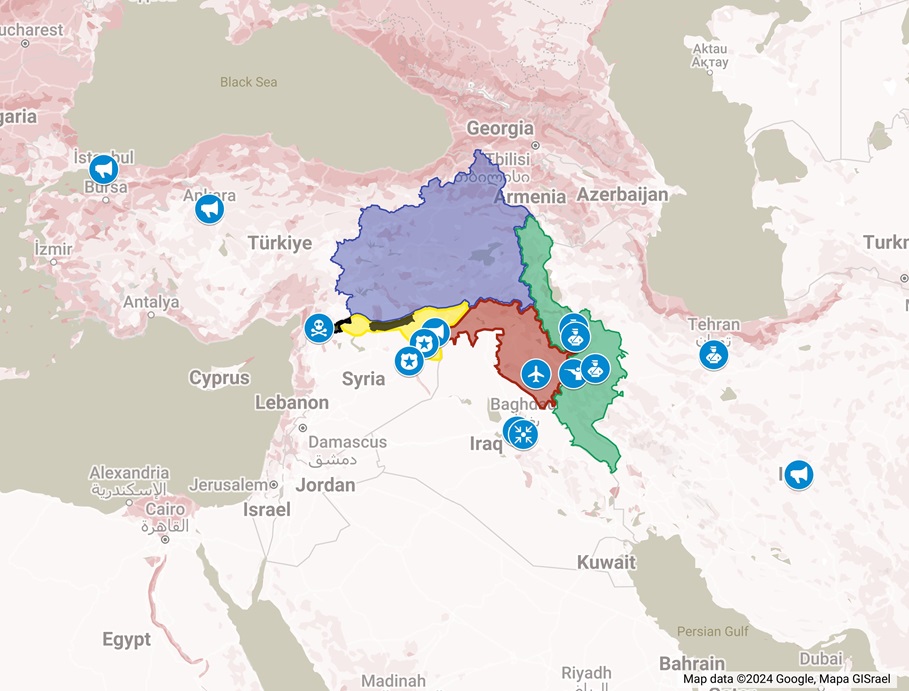1.1K
A weekly brief of events occurred in the Kurdistan regions of Iran, Iraq, Syria, and Turkey.
Iran
- The Iranian regime launched a new crackdown on women and redoubled its efforts to enforce the nation’s strict hijab laws. The regime’s most recent crackdown began when the Islamic Revolutionary Guard Corps (IRGC) formed a new security unit tasked with assaulting and detaining women, including teenagers, who violate hijab laws. Office of the United Nations (UN) High Commissioner for Human Rights spokesperson Jeremy Laurence claimed Iranian authorities have shut down hundreds of businesses for failing to enforce hijab laws. Concurrently, over 160 Iranian lawmakers expressed support for a new “mandatory hijab law.” Meanwhile, the regime arrested more Kurds last week, including a member of the teachers’ union in Senna named Khaled Ahmadi, an activist named Matin Hassani in Bokan, an athlete in Urmia named Afshin Nejadaziz, and two religious activists in Saqqez. Moreover, the Hengaw Organization for Human Rights reported the regime sentenced two Kurdish protesters in Bokan to 15 months and 11 days in prison. Simultaneously, Iranian border guards wounded two Kurdish border porters (kolbar) near Nowsud. Lastly, the U.S. Department of the Treasury imposed sanctions on more than a dozen “entities, individuals, and vessels” facilitating the transfer of Iranian drones.
Iraq
- On April 26, two suicide drones struck the Dana Gas-operated Khor Mor gas field in Sulaymaniyah Governorate’s Qadir Karim District. The attack killed four Yemeni Dana Gas employees and wounded several others. Unidentified perpetrators have targeted the UAE-based company several times, and Iranian-backed militias are suspected of perpetrating the attacks. The Kurdistan Regional Government (KRG) said the attack halted the provision of gas to Iraqi Kurdistan’s power plants and reduced the region’s electricity supply by approximately 2,500 megawatts. On Sunday, Dana Gas temporarily suspended production at Khor Mor due to concerns about its workers’ safety.
- President of Kurdistan Region Nechirvan Barzani met several Iraqi officials in Baghdad, including Iraqi President Latif Rashid, Prime Minister Mohammed Shia al Sudani, and acting Speaker of the Council of Representatives Mohsen al Mandalawi. According to several statements from Barzani’s office, the meetings addressed numerous ongoing issues between Baghdad and Erbil, most notably a tentative agreement for Baghdad to provide funds for the salaries of public employees in Iraqi Kurdistan. Barzani and al Sudani stressed “the significance of strengthening relations between Erbil and Baghdad and emphasized the need for continued backing from all Iraqi political parties.”
- Iraq’s pro-Iran parties, mostly those from the Coordination Framework, responded to U.S. condemnation of an amendment to Iraq’s anti-prostitution law that was passed by the Council of Representatives by collecting over 61 signatures on a petition demanding the expulsion of U.S. Ambassador to Iraq Alina Romanowski. Iraq’s anti-prostitution law was passed in 1988, but Saturday’s amendment imposes harsh penalties for homosexuality, gender transition surgery, intentional practice of effeminacy, and promoting “sexual deviancy.”
Syria
- The Syrian Democratic Forces (SDF), backed by the U.S.-led Coalition, arrested three ISIS (Da’esh) terrorists and killed one during raids in Deir Ez Zor Governorate. Concurrently, the Kurdish-led internal security forces (Asayesh) announced the arrest of three Assad regime terrorists and confiscation of an improvised explosive device (IED) and several remote detonators during a “special security operation.” Further, the Asayesh announced the arrest of 25 dangerous Da’esh operatives responsible for killing and torturing women and men and spreading extremist ideology in the al Hol camp. The al Hol and al Roj camps continue to hold thousands of Da’esh members and their relatives. That said, the Autonomous Administration of North and East Syria (AANES) repatriated 17 women and 33 children from Da’esh families to Tajikistan. Concomitantly, the AANES responded to a report from Amnesty International that criticized its handling of Da’esh detainees and included torture allegations. The AANES said it appreciates reports from human rights organizations but went on to assert it cannot handle the massive financial costs of the facilities and repeated its calls for help from the international community in dealing with the detainee issue. The AANES also claimed the Amnesty International report is based on interviews with active terrorists or agents of influence vice those who live in the camps.
- According to the Syrian Observatory for Human Rights (SOHR), Turkish-backed groups killed one civilian and wounded two others in the Shara District of occupied Afrin. Additionally, Turkish proxies arrested five civilians last week across Afrin, continuing their practice of ransom takings against the remaining Kurdish population.
Turkey
- Turkey’s Foreign Affairs Ministry responded to the annual human rights report by the Department of State on Turkey, stating that the report “contains, as in previous years, unfounded allegations, erroneous information, and prejudiced comments.” The report highlights abuses and violations by the Turkish government, including “enforced disappearance; torture, or cruel, inhuman, or degrading treatment or punishment by the government”. It also acknowledges “crimes involving violence” against Kurds and sheds light on violations by Turkish proxies in Syria. Other issues mentioned include pressure on journalists working for pro-Kurdish outlets and self-censorship by publishers to avoid prosecution for releasing Kurdish works. Separately, the Turkish government banned a book by jailed Kurdish politician Gültan Kışanak addressing political Kurdish women prisoners in Turkish jails.
- The Pro-Kurdish Peoples’ Democratic and Equality Party (DEM) has vowed to participate in mass numbers on International Workers’ Day, May 1, across the country. However, fearing the potential for anti-government protests, Turkish authorities have banned rallies and gatherings in Istanbul’s famous Taksim Square on May 1.

